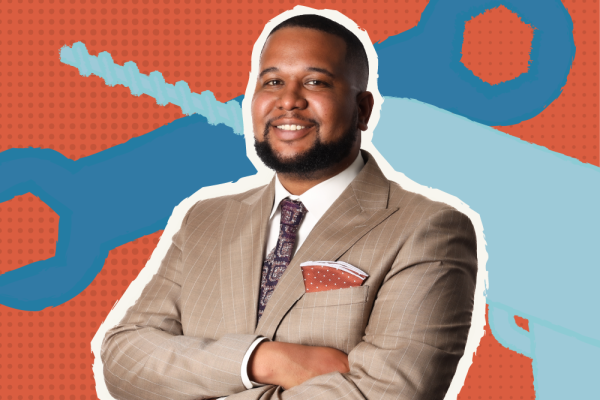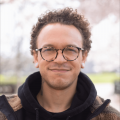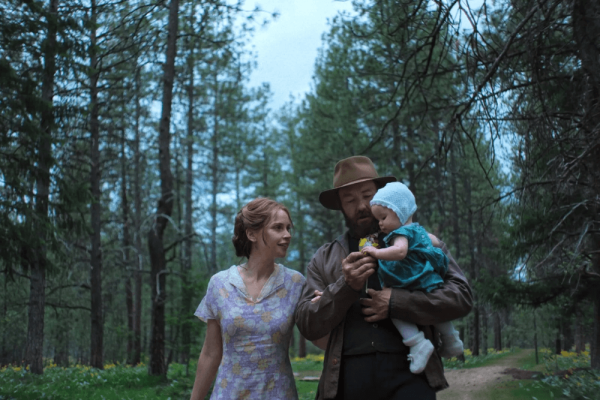This interview is part of The Reconstruct, a weekly newsletter from Sojourners. In a world where so much needs to change, Mitchell Atencio and Josiah R. Daniels interview people who have faith in a new future and are working toward repair. Subscribe here.
When I look at the pictures of the 2025 protests in Los Angeles, I can’t help but think of the 2014 Ferguson, Mo., protests which happened after the police killing of Michael Brown. Whether in Ferguson or LA, the imagery is eerily similar: A thick, blue line of police officers on the street; unarmed protesters being cuffed by heavily armed cops; military tanks; smoke grenades; a diverse group of people in a standoff with police, hands raised above their heads.
Some of the discourse surrounding the LA protests reminds me of similar things I heard back in 2014, too. On the one hand, you have centrists and liberal pundits who are lecturing protesters about needing to remain nonviolent — which is quite easy to suggest from a work-from-home station largely insulated from the raids that working class Angelinos are enduring. On the other hand, there are the cynics — a group that, despite my best efforts, I sometimes find myself identifying with — and they are asking if protesting makes any difference at all.
Equity advocate, organizer, and author Jonathan Pulphus has something to say to both pundits and cynics alike. Born and raised in North St. Louis, Pulphus was a 19-year-old student at Saint Louis University in 2014 at the time of the Ferguson protests. When I read the introduction to Pulphus’ forthcoming book, With My People, which is about his experience as a student activist and his recommendations to the next generation of student activists, I realized that our paths had briefly crossed on October 12, 2014. I had driven to Ferguson with a group of my seminary classmates and, after joining a throng of protesters late that night, we occupied the campus of Saint Louis University. Pulphus had shown campus security his student ID and claimed all of us in the crowd as his guests. Engaging in protests, if nothing else, certainly leads to connections that reverberate in unexpected ways.
In my interview with Pulphus, we discuss current restrictions around protesting and free expression, the legacy of the Ferguson protests, the failures of the Black Lives Matter movement, and whether protesting makes a difference.
This interview has been edited for length and clarity.
Josiah R. Daniels, Sojourners: Your book is called With My People and comes out September 16, 2025. Tell me why you wanted to write this book.
Jonathan Pulphus: It became apparent to me while in the midst of organizing both in community and on [Saint Louis University’s] campus that if you get all your reports from TV, then you only see these burning buildings, people breaking into stores, conflict. What you didn’t see was the community that was being built, the relationships being formed, the change that was gonna happen. The book only really traces the first nine months — really from August until about May — because I’m writing from the perspective of a student. So, it traces my sophomore year, month to month, what I was facing, and what I was going through.
You get stories all the time about how student athletes have to balance their studies, what’s happening on the court or what’s happening in the field. But what you often don’t get are narratives that paint a picture of what it’s like having to wrestle all those different things in class, and then also being in the streets, being both a student and an activist. Being at those meetings, being at the police department, being at those malls and shopping centers and shutting all this stuff down. I wanted to paint a picture of that.
[I also wanted to offer] some organizing tips for young people coming up. There’s a mentor of mine who talks about how he doesn’t have a formal education above high school, which is neither here nor there, but he talks about how he has a Ph.D. in mistakes. So, I wanted to show some of my own pitfalls, some things I’ve tripped over, some of the hurdles I couldn’t jump over because it was hard balancing everything.
What keeps your hope alive?
I would say first, my faith in God. I think that definitely helped keep me grounded because with faith, despite all the nonsense, the danger, the threat — all those things that we were facing, I knew there was something larger than what was happening. That allowed me to move forward with conviction and a sense of purpose. Without hope, I don’t think we would’ve made it that long in the streets.
One thing you write about in With My People is that there’s not been a lot written about the Ferguson uprising from the perspective of people who were in the Ferguson community. I thought that was a great point. What is a story that comes to mind for you that people outside the community wouldn’t know?
One story that comes to mind: I’m in the car with my mom. At McDonald’s on the corner of West Florissant Ave., which is actually a couple blocks down from Canfield Green where Michael Brown had been walking and when he had that confrontation. The tanks were out there.
It was late at night, probably past curfew. And I’m just sitting in the car with my mom and this sister walks up, with her hands up. And as she’s kneeling in front of the tanks, they continue to move forward, shooting out canisters of gas. She refused to move. I was worried they were gonna run over her.
So, I jump out my mama’s van and I run to her, I pick her up and pull up to the grass area. I had been pepper sprayed for the first time in my life some days or weeks prior, so I knew how to treat what she was experiencing. [The police] were recklessly shooting out these cans onto the street, so they end up breaking one of the windows to the McDonald’s.
Some people from the community ran into the McDonald’s and got milk out to treat the pepper spray because you don’t put water on pepper spray, you put milk. I ended up pouring the milk on her face and that moment got captured by the St. Louis Post-Dispatch. Robert Cohen received a Pulitzer Prize for his coverage of the event. We were literally trying to save ourselves while we’re also trying to save democracy at that moment.
When George Floyd was murdered, it became popular to hang a Black Lives Matter flag outside your church or put a sign in your front yard. What were your feelings during the second permutation of the Black Lives Matter movement? How were you thinking about it?
We’ve discussed everything that’s happened in the last ten years. And I have my abolitionist sensibilities; I’ve grown into that. An officer being arrested still doesn’t do anything for the system itself. Darren Wilson was never convicted of the murder [of Michael Brown]. When George Floyd happened, it was caught on camera, right? You literally witnessed the knee on the neck. You see it, and I think some of the people who were younger when Michael Brown was murdered were coming of age when George Floyd happened.
I think that there’s these questions about how to support and build the movement infrastructure to support the ongoing grassroots work that’s happening. I know Brown’s family took issue with the BLM network itself. BLM hadn’t really invested any resources back into Ferguson, even though the hashtag itself blew up right after Ferguson. It existed prior to Ferguson, but it didn’t become as well-known until after.
Some of those conversations are uncomfortable conversations.
One of my personal frustrations with one of the outcomes of the Black Lives Matter movement was how commercialized it became. I think that some of the founders of the Black Lives Matter Global Network tried to cash in on it. I wonder how you wrestle with that?
I’m more diplomatic than some of my peers out here. I got to meet Alicia [Garza] at a convening that happened in Cleveland, Ohio. This is shortly after the Tamir Rice murder.
The Ferguson cohort we brought down to Cleveland didn’t interrupt the convention, but we called for an intervention in terms of having a conversation early on with the founders, because we saw the direction things seemed to be going.
We felt like despite our best efforts, Ferguson [was] brushed over and that there wasn’t infrastructure and support happening on the ground. Understand: People dropped out of school; people lost their jobs. I will say there’s no way you [should] end up with a multimillion dollar mansion in California. Meanwhile, Brown’s family is pinching pennies trying to lift up, help, support, and build infrastructure here. That doesn’t make any sense to me.
If we had had honest conversations about resources and funding and stuff like that early on, [these things] would’ve been prevented.
Considering the current state of our country, do you feel like the Ferguson protests worked? I’m wondering, just in general, why you believe protesting makes a difference?
I don’t think people would know Michael Brown’s name if [we hadn’t protested].
Without protest, I don’t think we would get a conviction in the George Floyd case. Some of these, you could argue, are concessions. The state just says, “OK, we’ll give them one.” But when you talk about, for example, some of the gains that happened in the movement here, some of the leaders who were on the front lines, who had no prior political experience but went from bullhorns to ballots. [Former U.S. Representative] Cori Bush, right?
We have to be prepared to respond to their response as we get gains [and we must] protect those wins. Ultimately, we are trying to move the needle forward. Part of the thing is, when it comes to protest, [you do it] when you’ve exhausted everything: When you tried meeting the decision makers, you tried to attend forums, you gave your comment, and people still don’t hear you. But when you start shutting down public spaces, shopping centers, when you start costing the establishment money, when you start interrupting board meetings, when you put your body on the line, then it becomes something different.
Got something to say about what you're reading? We value your feedback!






